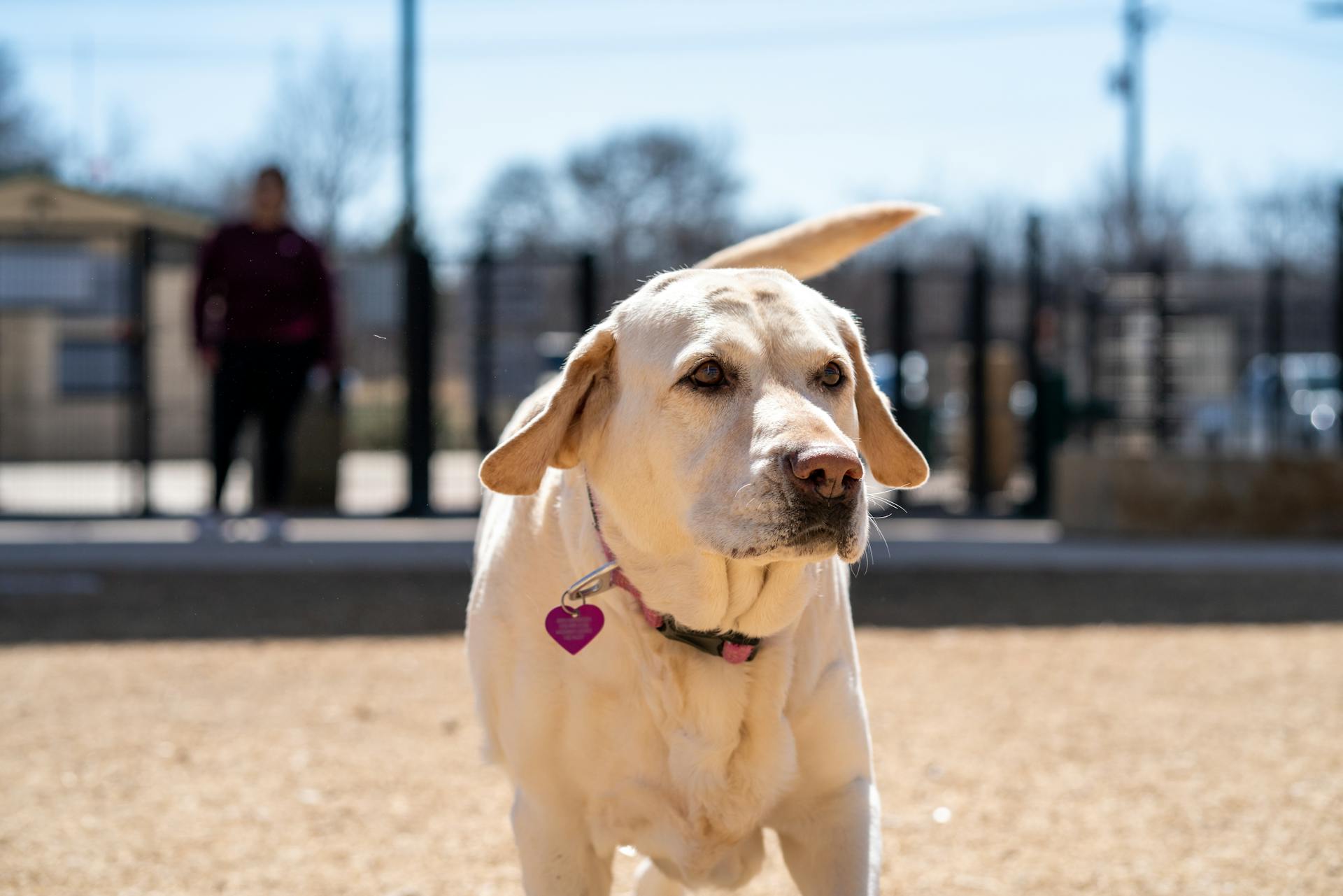
An assistance animal is a type of animal that provides support and assistance to individuals with disabilities.
The Fair Housing Act defines an assistance animal as a dog or other animal that provides emotional support, comfort, or companionship to an individual with a disability.
To qualify as an assistance animal, the animal must be trained to perform specific tasks or provide emotional support to alleviate symptoms of a disability.
Assistance animals can be any type of animal, but dogs are the most common.
You might like: Emotional Support Animal
Assistance Animal Definition
A service animal is defined as a dog that has been individually trained to do work or perform tasks for an individual with a disability. The work or task a dog has been trained to provide must be directly related to the person's disability.
Examples of such work or tasks include guiding people who are blind, alerting people who are deaf, pulling a wheelchair, alerting and protecting a person who is having a seizure, reminding a person with mental illness to take prescribed medications, calming a person with Post Traumatic Stress Disorder (PTSD) during an anxiety attack, or performing other duties.
Readers also liked: Blind Person and Dog
Service animals are working animals, not pets. Dogs whose sole function is to provide comfort or emotional support do not qualify as service animals under the ADA.
Here are some key characteristics of service animals:
- Must be individually trained to do work or perform tasks
- Must be directly related to the person's disability
- Must be a dog (although some state and local laws may allow other animals to be considered service animals)
It's worth noting that some state and local laws may define service animals more broadly than the ADA does. If you're unsure about the definition of a service animal in your area, you can contact your state's attorney general's office for more information.
Service animals are not the same as emotional support animals or therapy animals, which are animals that provide comfort or companionship but are not trained to perform specific tasks. While emotional support animals and therapy animals may be allowed in certain situations, they do not have the same rights as service animals under the ADA.
For another approach, see: Ada Assistance Animal
Rules and Regulations
Under the Americans With Disabilities Act (ADA), businesses and organizations that serve the public must allow people with disabilities to bring their service animals into all areas of the facility where customers are normally allowed to go. This includes restaurants, hotels, taxis, and government offices that serve the public.
Staff are only allowed to ask two questions to determine if a dog is a service animal: (1) is the dog a service animal required because of a disability, and (2) what work or task has the dog been trained to perform. They cannot ask about the person's disability, require medical documentation, or ask that the dog demonstrate its ability.
Businesses must accommodate people with disabilities and their service animals, even if there are allergies or fears of dogs. For example, if someone with a disability and a person with allergies must spend time in the same room, they should be assigned to different locations within the room or different rooms in the facility.
Here are some key rules to keep in mind:
- Staff can only ask two questions to determine if a dog is a service animal.
- Businesses must accommodate people with disabilities and their service animals.
- Staff cannot ask about a person's disability or require medical documentation.
- Businesses must allow service animals in public areas, even if state or local health codes prohibit animals on the premises.
Animals Must Be Controlled
Service animals must be under the control of their handler at all times. This is a crucial aspect of the Americans with Disabilities Act (ADA).
A service animal must be harnessed, leashed, or tethered to its handler unless the individual's disability prevents using these devices or they interfere with the animal's safe performance of tasks. This rule applies to most service animals.
However, if an individual's disability prevents them from using a harness, leash, or tether, they must maintain control of the animal through voice, signal, or other effective controls. This ensures the animal remains under control and doesn't pose a risk to others.
The specific requirements for service animals can be found in the ADA, which emphasizes the importance of control and safety.
Rules and Exclusions
Businesses that serve the public are required to allow people with disabilities to bring their service animals into all areas of the facility.
Staff may ask two questions if it's not obvious what service an animal provides: (1) is the dog a service animal required because of a disability, and (2) what work or task has the dog been trained to perform.
You cannot be asked about your disability, require medical documentation, or ask that the dog demonstrate its ability to perform the work or task.
Allergies and fear of dogs are not valid reasons for denying access or refusing service to people using service animals.
A person with a disability cannot be asked to remove their service animal from the premises unless the dog is out of control or not housebroken.
Here are some specific rules and exclusions related to service animals:
Staff are not required to provide care for or supervision of a service animal.
Types of Assistance Animals
Service animals are defined as dogs that are individually trained to do specific tasks for people with disabilities. They're not just pets, but working animals that assist individuals with tasks such as guiding the blind or alerting those who are deaf.
Comfort animals and therapy animals, on the other hand, work in situations where stress levels are high, but they're not trained to perform specific tasks for individuals with disabilities. Comfort animals work during active crises, while therapy animals provide healing contact in institutional or clinical settings.
Emotional support animals, which are often requested as a reasonable accommodation in the workplace, are not limited in type by Title I of the ADA, but their status as assistance animals is distinct from service animals.
Assistance, Support, Therapy Dogs
Service animals are dogs that are individually trained to do work or perform tasks for people with disabilities. They are not pets, and their work or task must be directly related to the person's disability.
Examples of service animals include dogs that guide people who are blind, alert people who are deaf, or pull a wheelchair. They can also be trained to alert and protect a person who is having a seizure, remind a person with mental illness to take prescribed medications, or calm a person with PTSD during an anxiety attack.
Dogs that provide comfort or emotional support do not qualify as service animals under the ADA, but some State and local laws may define service animals more broadly.
Therapy animals, on the other hand, provide people with healing contact in an institutional or clinical setting to improve their physical, social, emotional, or cognitive functioning. They are not trained to perform a specific task for an individual with a disability.
Emotional support animals are not the same as service animals, and their mere presence provides comfort. However, some State or local laws may allow people to take emotional support animals into public places.
Here's an interesting read: Is an Emotional Support Animal an Assistance Animal
Miniature Horses
Miniature horses can be considered assistance animals, just like service dogs, as long as they've been individually trained to do work or perform tasks for people with disabilities.
These horses typically range in height from 24 inches to 34 inches measured to the shoulders and weigh between 70 and 100 pounds.
To determine if a miniature horse can be accommodated in a facility, entities must assess four key factors.
The first factor is whether the miniature horse is housebroken, which is a basic requirement for any animal in a public space.
The second factor is whether the miniature horse is under the owner's control at all times, ensuring public safety.
Facilities must also consider whether they can accommodate the miniature horse's type, size, and weight, which may require modifications to their policies.
The fourth and final factor is whether the miniature horse's presence will compromise legitimate safety requirements necessary for the safe operation of the facility.
Worth a look: Miniature Horse Service
Certification and Registration
Individuals who claim to have service animals are not exempt from local animal control or public health requirements.
You may be wondering if you need to register your service animal, but the truth is, mandatory registration is not permissible under the ADA. However, service animals are subject to the same licensing and vaccination rules as all dogs.
Some communities have a voluntary registry for service animals, which can be helpful in emergency situations. For example, it can inform emergency staff to look for service animals during an evacuation process.
You can choose to register your service animal for a reduced dog license fee in some areas, but this is not a requirement.
Sources
- https://www.ada.gov/resources/service-animals-2010-requirements/
- https://www.dmv.ca.gov/portal/driver-education-and-safety/educational-materials/fast-facts/service-animals-ffdmv-5/
- https://www.ada.gov/resources/service-animals-faqs/
- https://www.sundogtherapy.com/assistance-dogs/
- https://adata.org/service-animal-resource-hub/differences
Featured Images: pexels.com


